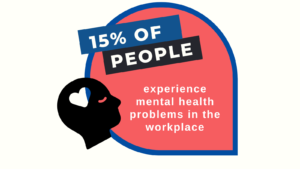Putting mental wellness high on the agenda
Mental wellness in the workplace is a far bigger challenge than most of us realise. Putting this into context is a great starting point to getting commitment to prioritising it.
Following on from that there are lots of steps we can take to help.
The ultimate benefits for our people and organisations are huge. They should be pursued – out of decency and care for your people. They are worth pursuing out of sheer expediency.
Understanding the context – costs and benefits – helps put us in a better place to get buy in to prioritising mental health.
According to MIND:
- 15% of people experience mental health problems in the workplace.
- 13% of all sickness absence days in the UK can be attributed to mental health conditions.
- Women in full-time
 employment are nearly twice as likely as men to have mental health problems.
employment are nearly twice as likely as men to have mental health problems.
According to MentalHealth.org
- 14% of people have resigned and 42% have considered resigning as a result of workplace stress.
The personal costs of the above are huge. The organisational costs immense. Ignoring mental health challenges of our people carries high costs and risks (handling it well carries long-term benefits).
Increasing understanding
Helping people across the organisation understand the extent of mental health problems in the workplace is a great start. Doing so makes people more likely to look out for their colleagues. It also makes people realise that if they have problems themselves, they are not alone.
Encouraging listening and talking
Take down the barriers to speaking up
There are 3 key factors which repeatedly stop people raising their problems – whether it is directly about mental wellness or other things. Fear, futility and function.
- Fear: Will discussing problems impact on how I am treated (in a negative way)? Will it lead to me having further deeper problems, threaten my career or change the way I am treated adversely?
- Futility: Will it make any difference anyway – or will it be to no avail?
- Function: Lack of clarity about any process – formal or informal around how I can raise problems.
Cultural aspects
There are a number of aspects of the workplace culture which can materially impact wellness of our people.
- Ensure respect: Is our environment respectful? Are we free of bullying, harassment and other toxic forms of behaviour? These factors are highly dangerous and too often go unnoticed.
- Empower your people: People with a reasonable degree of autonomy in their day-to-day job role tend to have higher satisfaction and greater mental wellness.
- Manageable workload: Feeling forever that you are faced with too much work and too little resource is highly toxic to wellbeing.
- Feeling valued: Feeling valued tends to enhance people’s job satisfaction and mental wellness.
Understand your people
As an aware employer you should ensure you are regularly checking in on the above. Whether your people feel they have problems with mental health, whether they feel they can raise them, and whether your cultural factors are in the right place. To help ensure that you have robust processes for collecting data, for empowering your people to tell you if they are not in the right place, for listening and acting on that information.
Ideally you will embed a culture of listening – and with it talking:
Elevate your workplace culture with our most popular engagement tools - Free to download
The Definitive Guide to Workplace Bullying
Download the guide and learn how to create a zero tolerance workplace culture and give people a voice
Building a Successful Speak Up Culture in your organisation
Download our free e-book and start improving your organisational health
The Concise Guide to Engaging and Retaining Employees
Download our free e-book to find out how to engage and retain your top talent
Why Civility Matters
Download our infographic to share with your teams to highlight why civility matters





